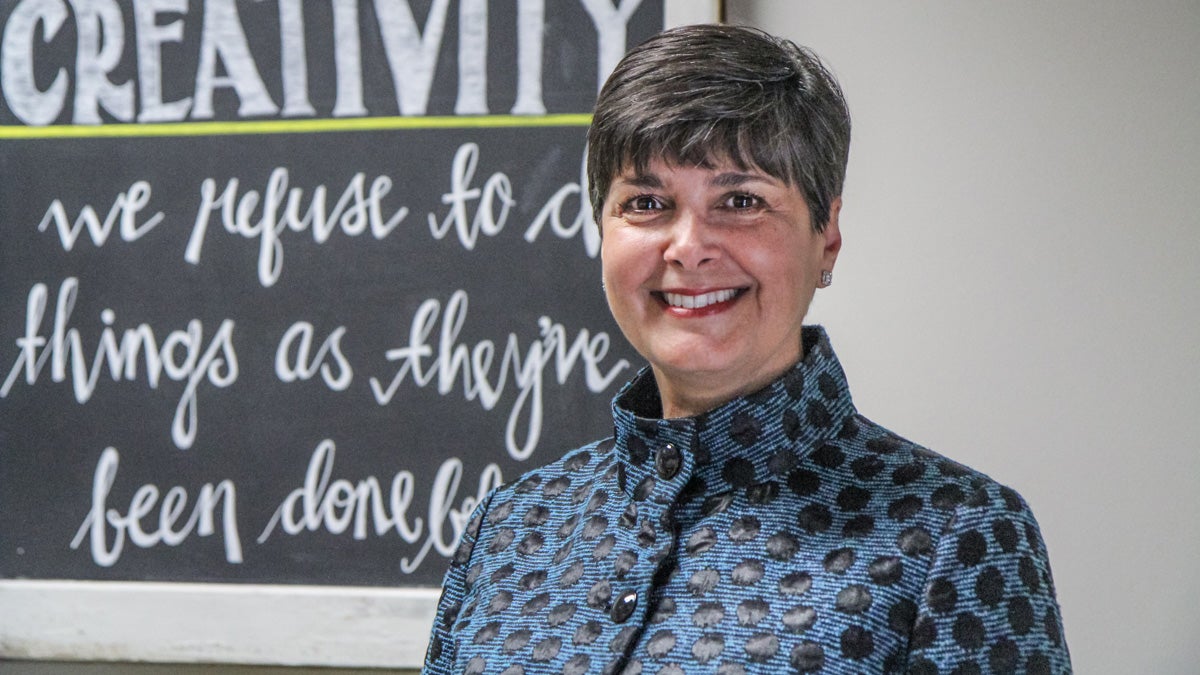Turning around the health care crisis, one student at a time

Dale Keshishian (Kimberly Paynter/WHYY)
What if there was an outbreak of a deadly virus and not enough physicians to stop the epidemic? If this sounds like a futuristic horror film, hold onto your popcorn because it could be coming to a hospital near you.
“According to a study by the Association of American Medical Colleges, by 2020, one-third of doctors will reach retirement age, resulting in a shortage of 45,000 primary care physicians, and over 46,000 surgeons and medical specialists,” says Dale Keshishian of Wayne, Pennsylvania. There are not enough students entering health care fields to make up for the deficit.
When she learned that statistic at a medical conference seven years ago, Keshishian says she nearly fell off her chair. “I believe that insufficient talent in the health sciences is a threat to national security.”
She couldn’t shake the idea. If only there were a national program to excite students about health careers, to provide a STEM (science, technology, engineering and math) curriculum for schools that didn’t have one, and to mentor, support and track students from 9th grade through graduate school.
She saw the problem; she knew the solution. At 53, Keshishian quit her job and started developing HealthWorks Academies, a national health sciences program based in Media, Pennsylvania, designed to turn the tide of the health care crisis.
“I had been in clinical medicine, operations management and leadership development for over 40 years. Given my background, there was no better person to do this,” she says.
“Not every school offers a STEM curriculum, and those that do give students math and science tools but often do little to prepare them for the careers that will be in demand. By the time they enter college, it’s too late,” says Keshishian.
A general shortage of health care professionals is not the only problem. There is also a growing disparity in racial minorities. “African-American and Latino populations are growing, but they are not equally represented in the professional life science workforce,” says Keshishian. HealthWorksAcademies will address this problem by exposing inner city high school students to a wide range of healthcare careers, along with the mentoring necessary to sustain their interest past graduation and through college.
Like any startup, success didn’t happen overnight. Keshishian spent years refining her concept, establishing partnerships, building a team and securing sponsors. “In the early stages, I was just thinking of starting a charter school, but Gabriel Garcia, MD, the associate dean of admissions at Stanford Medical School told me, ‘If you really want to make a difference, create a program that can be instituted anywhere and that targets not just honor students but average students.'”
In May 2014, the high school Keshishian had lined up for her fall launch backed out. “It meant delaying the launch for another year, and had a ripple effect on all of our other collaborators,” says Keshishian. “As it turned out, it was the best thing that could have happened. We took another look at our resources and a wonderful school stepped in.”
However, it was the personal issues that took the biggest toll. “I got divorced after 34 years and lost my job. My former husband called to say happy Valentine’s Day. We talked and laughed for over an hour. He died in his chair, reading a book the next day,” says Keshishian. “Then my father died.”
As months turned into years, friends warned her, “If this hasn’t happened by now, it’s not going to. Get a job. Take care of yourself!” But a haunting vision kept Keshishian moving forward. “I saw people lining up in the street the way they did in 1929. But not for bread. For health care.”
In 2014, she scored a founding corporate sponsorship with Rothman Institute, an orthopaedic research center, with a considerable grant, job shadowing and mentors. “If you ask a typical ninth grader about health careers, they only know about doctors, nurses and lab technicians who draw blood,” says Keshishian. “They are not aware of the vast number of careers in clinical medicine, healthcare technology or research. We take students out of the classroom into the workplace.”
However, students are not limited to local mentors. “We will pair them with mentors throughout the country who match their particular area of interest,” says Keshishian. So a student in Philadelphia with a passion for medical research might be mentored, from ninth grade through graduate school, with a researcher at NIH.
Kensington Health Sciences Academy has been selected as HealthWorks Academies’ launch school, starting this fall. “We will link STEM education and what students learn in school to what they can do in life,” says Keshishian. “The curriculum, teacher training, online support and mentoring we provide will impact graduation rates, college completion and create a pipeline for the health sciences workforce.”
Somewhere, Ben Franklin is smiling. He founded our country’s first hospital in Philadelphia 1751. Now, thanks to Dale Keshishian, our city will take a leading role in developing medical professionals for the nation.
WHYY is your source for fact-based, in-depth journalism and information. As a nonprofit organization, we rely on financial support from readers like you. Please give today.

